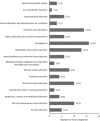Allogeneic Umbilical Cord Blood Infusion for Adults with Ischemic Stroke: Clinical Outcomes from a Phase I Safety Study
- PMID: 29752869
- PMCID: PMC6052613
- DOI: 10.1002/sctm.18-0008
Allogeneic Umbilical Cord Blood Infusion for Adults with Ischemic Stroke: Clinical Outcomes from a Phase I Safety Study
Abstract
Stroke is a major cause of death and long-term disability, affecting one in six people worldwide. The only currently available approved pharmacological treatment for ischemic stroke is tissue plasminogen activator; however, relatively few patients are eligible for this therapy. We hypothesized that intravenous (IV) infusion of banked unrelated allogeneic umbilical cord blood (UCB) would improve functional outcomes in patients with ischemic stroke. To investigate this, we conducted a phase I open-label trial to assess the safety and feasibility of a single IV infusion of non-human leukocyte antigen (HLA) matched, ABO matched, unrelated allogeneic UCB into adult stroke patients. Ten participants with acute middle cerebral artery ischemic stroke were enrolled. UCB units were matched for blood group antigens and race but not HLA, and infused 3-9 days post-stroke. The adverse event (AE) profile over a 12 month postinfusion period indicated that the treatment was well-tolerated in these stroke patients, with no serious AEs directly related to the study product. Study participants were also assessed using neurological and functional evaluations, including the modified Rankin Score (mRS) and National Institute of Health Stroke Scale (NIHSS). At 3 months post-treatment, all participants had improved by at least one grade in mRS (mean 2.8 ± 0.9) and by at least 4 points in NIHSS (mean 5.9 ± 1.4), relative to baseline. Together, these data suggest that a single i.v. dose of allogeneic non-HLA matched human UCB cells is safe in adults with ischemic stroke, and support the conduct of a randomized, placebo-controlled phase 2 study. Stem Cells Translational Medicine 2018;7:521-529.
Keywords: Cellular therapy; Clinical trials; Cord blood; Human cord blood; Stem cells; Umbilical cord; Umbilical cord blood.
© 2018 The Authors Stem Cells Translational Medicine published by Wiley Periodicals, Inc. on behalf of AlphaMed Press.
Figures


References
-
- Mozaffarian D, Benjamin EJ, Go AS et al. Heart disease and stroke statistics–2015 update: A report from the American Heart Association. Circulation 2015;131:e29–e322. - PubMed
-
- White BC, Sullivan JM, DeGracia DJ et al. Brain ischemia and reperfusion: Molecular mechanisms of neuronal injury. J Neurol Sci 2000;179:1–33. - PubMed
-
- Hazell AS. Excitotoxic mechanisms in stroke: An update of concepts and treatment strategies. Neurochem Int 2007;50:941–953. - PubMed
Publication types
MeSH terms
Substances
LinkOut - more resources
Full Text Sources
Other Literature Sources
Medical
Research Materials

